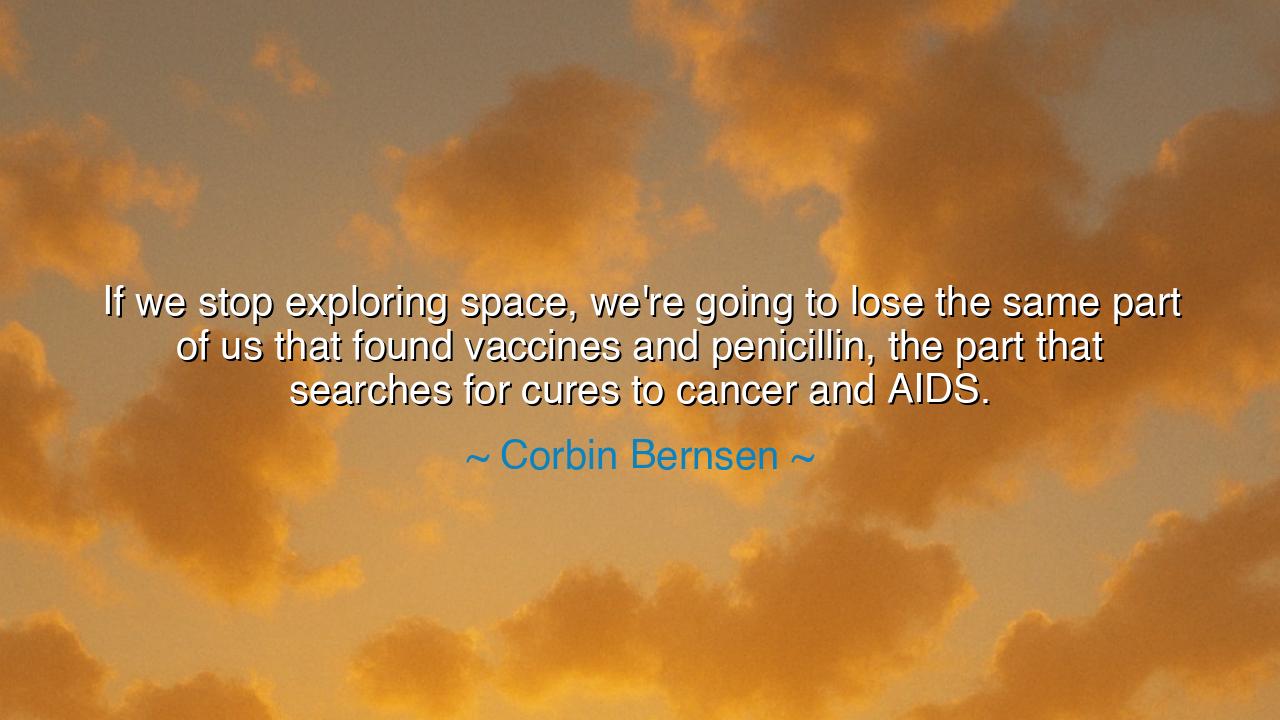
If we stop exploring space, we're going to lose the same part of
If we stop exploring space, we're going to lose the same part of us that found vaccines and penicillin, the part that searches for cures to cancer and AIDS.






Hear, O children of the future, the words of Corbin Bernsen, spoken with the weight of prophecy: “If we stop exploring space, we’re going to lose the same part of us that found vaccines and penicillin, the part that searches for cures to cancer and AIDS.” In this saying lies a truth as vast as the heavens themselves. For it is not merely about rockets and stars, but about the flame within mankind—the sacred fire of curiosity and the relentless hunger to know, to heal, to transcend. Should that fire be extinguished, humanity would not simply halt; it would wither, like a tree denied the light of the sun.
For what is exploration but the outer expression of the inner spirit of discovery? When men looked up to the night sky and longed to walk among the stars, it was the same yearning that led them to peer into the invisible world of disease, to wrest life-saving secrets from the realm of the unseen. The quest for the cosmos and the quest for cures are born of the same breath—the refusal to accept limits, the boldness to say, “There must be more than this.” Thus, Bernsen warns us: if we forsake the stars, we risk forsaking the very essence that makes us creators, healers, and dreamers.
History offers us a shining example in the story of Louis Pasteur. In an age when disease ravaged families and fear stalked every home, Pasteur dared to explore the unseen world of microbes, invisible yet deadly. His courage to explore what others could not see gave us the gift of vaccines, a shield that has saved countless lives. His work was no different in spirit than the voyages of the astronauts who leapt beyond Earth; both were acts of daring exploration, both were triumphs of human curiosity. If society had said, “Do not waste time on such questions,” millions would have perished who now live.
So it is with space exploration. It is not only about distant planets or glittering stars, but about preserving the will to push beyond the known. When humanity set foot on the Moon, it was not only a victory of science but of spirit. It declared that we are not bound by the soil of our birth, but are wanderers destined for discovery. To abandon this pursuit is to silence the voice within us that says, “Go further.” And if that voice is silenced, we risk losing the very drive that once gave us penicillin, that might yet bring forth cures for cancer and AIDS.
Let us remember too the tale of the Polynesian voyagers, who with only stars to guide them sailed across the vast Pacific, discovering islands unseen by any eye before them. Their courage to explore sustained their people, gave them new lands, and proved that the human spirit is at its best when it dares the unknown. If those ancestors had chosen the safety of familiar shores, their descendants would have been fewer, their world smaller. In the same way, if we turn our backs on the heavens, our future will be narrow and impoverished.
Therefore, the lesson is clear: never let the fire of curiosity be extinguished. Protect and nurture it, for from it comes every breakthrough, every healing, every step into the future. Do not say, “We have enough knowledge; let us rest.” For rest is the herald of decay. Instead, let each generation look outward and inward with boldness—outward to the stars, inward to the mysteries of life. Both journeys are one, for both are driven by the same immortal flame.
And in your own life, O listener, embrace this truth: be ever a seeker. Do not let fear or complacency chain your mind. Explore not only the skies but the depths of your own potential. Ask questions others ignore, pursue knowledge others deem useless, and in doing so, you keep alive the spirit that has carried humanity from caves to cities, from ignorance to enlightenment, from Earth to the stars. Exploration is not only humanity’s destiny—it is its lifeblood.
So let Bernsen’s words resound in your soul: if we forsake the quest for the unknown, we forsake ourselves. Keep the flame of exploration alive, and you will not only honor those who came before, but you will give a gift to generations yet unborn: the promise of a humanity that forever dares, forever learns, forever reaches beyond the horizon.






AAdministratorAdministrator
Welcome, honored guests. Please leave a comment, we will respond soon